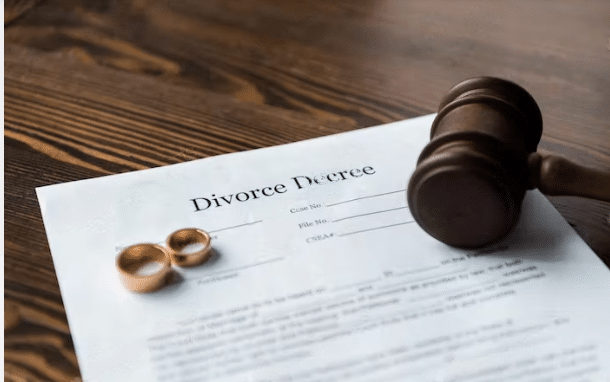Decree absolute | Dissolution Of Marriage

A Decree Absolute is a court order that most strictly governs divorce proceedings. A decree absolute can only be issued by the High Court and sets out specific conditions that must be met for a divorce to be granted. The conditions can include but are not limited to, a written agreement between the spouses, living apart for at least six months, or the death of one spouse. A decree absolute can also be used if one party objects to the proceedings or if children are involved.
Why is Decree of Absolute Important?
The decree absolute is an important document because it lists the rights and duties of all citizens in the United Kingdom. Divorce is a big decision that can have many repercussions. Whether you are considering filing for divorce or have already gone through the process, it’s important to know the benefits and advantages of the decree of absolute.
The decree of absolute is one of the most important legal documents in the United Kingdom. It can provide benefits and advantages when divorcing, including:
- The decree of absolute allows a party to divorce without going through a court process. The absolute decree can be obtained without going to the central family court.
- It eliminates any possibility of a reconciliation between the parties.
- The decree absolute is effective from the date both parties sign it.
- It can be used to dissolve marriages that have been registered anywhere in the world.
- This document sets out all the terms and conditions of your divorce, including what property you can keep and how the money will be distributed. Having this document in writing can avoid any misunderstandings or arguments down the road.
Effects of a Decree Absolute
A decree absolute is a court order that is a final order and binding, regardless of whether or not the parties involved have agreed to it. The effects of a decree absolute in the UK can be substantial. This is especially true when it comes to the divorce process. This can come as a surprise to many couples who were expecting to have to go through more formal steps, such as filing for divorce and waiting for a hearing.
One important consequence of a decree absolute is that it automatically dissolves the marital relationship. This means that all property belonging to either party becomes the state’s property unless otherwise specified in the decree absolute. This can be a very difficult process for both parties, and one or both must go through legal proceedings to get an absolute decree. One or both spouses could also be granted an annulment, which would restore the status quo ante before the decree absolute was issued (i.e., before the marriage began).
Who Needs A Decree Absolute?

In England and Wales, a decree absolute is a type of consent order allowing a divorcing couple to divide their property and assets without going through the court system. A decree absolute can be granted if one or both spouses cannot or will not resort to formal court proceedings. This type of order is typically only granted in cases where there is an irreconcilable difference between the spouses, and no other solution is available.
There are several reasons why a decree absolute may be necessary. Sometimes one spouse may refuse to participate in divorce proceedings or be unable to afford legal representation. In these cases, a decree absolute can give the other spouse the authority to take action on their behalf.
Sometimes a divorce can involve complex financial matters. A decree absolute can help resolve disputes over commercial property rights and financial claims without requiring lengthy negotiations or litigation.
How to Apply?
If you want to end your marriage and get a decree of absolute, there are a few things you need to do. In the UK, a divorce petition through a court is called a decree absolute. You will need to fill out an application and provide an additional certificate. With some help, it can be done easily.
1) Contact an attorney. If you don’t have an attorney, they can often help guide you through the process and ensure that all the required paperwork is submitted correctly.
2) Prepare your paperwork carefully. Make sure all the required documents are attached and submit them in order according to the directions on the application form. This includes copies of your marriage certificate, divorce, birth, and death certificate (if it applies). You will also need to submit an application fee and live in the UK for at least six months before filing for a decree absolute.
3) Attend court hearings. The final step in obtaining a decree of absolute is attending court hearings. This process can take several weeks or even months, so be prepared for a long wait.
Conclusion
In conclusion, decree absolute is a powerful legal tool that can help to divorce couples get their lives back on track. It can be necessary when the other party refuses to negotiate or when children are involved. However, it is important to know what rights and responsibilities you will have due to the decree and consult with an experienced attorney for legal advice if you consider using this option. If either party feels that the decree absolute is not being used fairly, they can file for a judicial review.
Was this article helpful? Let us know in the comments!
FAQs
What is the difference between decree absolute and divorce?
Divorce is a legal action which results in the termination of a civil partnership. It may be granted by a family court or entered voluntarily by both spouses. A decree absolute is a court order that declares that the marriage is irretrievably broken and orders immediate dissolution of the marriage. There are several reasons why a marriage might be terminated by court order. One reason is when one spouse petitions for divorce and the other spouse does not object. Another reason is when one spouse commits adultery, and the other spouse knows about it and does not object. Yet another reason is when one spouse cannot or will not live with the other in a harmonious relationship.
How long does a decree absolute take UK in 2023?
This question can be difficult to answer as several factors need to be considered, such as the type of decree being made and the jurisdiction in which it is being made. In the UK, a absolute decree takes around three months to be issued by the monarch. This is significantly shorter than in many other countries, where decrees can take up to six months. Issuing a decree absolute is an important step in the process of succession, as it confirms that the monarch has decided who should inherit the throne.
Can you cancel the divorce after the decree is absolute?
A decree absolute is a court order that terminates the marital relationship. The parties in the marriage are no longer legally married. In some circumstances, a divorce can be cancelled. This is usually if there are grounds for a reconsideration of the decree absolute and the couple can achieve an amicable financial settlement. If the divorce is cancelled, both parties must agree to it, and it will not be recognised by law.






